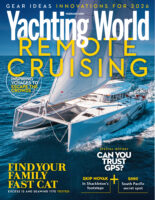Jerry Freeman takes a look at the runners and riders in the Open 40 class in the Faraday Mill OSTAR
The Faraday Mill OSTAR 2005 organised by the Royal Western Yacht Club, starts at Plymouth on Sunday 29 May. Without doubt, the most exciting racing in this year’s solo transatlantic race will be amongst the 40-footers.
OSTAR veterans Michel Kleinjans and Ronny Nollet, in their unrestricted Open 40s, are up against three of the new Class 40s from France with a strong challenge from Pieter Adriaans’ cat-rigged 40.
Class winner in the heavily windward 2000 race was Belgian Ronny Nollet when his extreme La Promese set a slowish time of 21days 6 hours. Ronny has campaigned this boat for seven years and in the right conditions the Rowsell design is probably the fastest 40-footer in Europe having proved its speed by completing the 1,200-mile outward leg of the Azores and Back race in six and a half days in 1999 and nearly six days in 2003. Michel Kleinjans sails his unlimited Roaring Forty, fresh from breaking the 2,500 mile Round Britain & Ireland solo record in 11days. A veteran of two OSTARs in the Figaro1, Michel holds the 30 ft class record at 20 days 14hrs. The Lutra-designed hull which displaces 4,300kg and sets 107sq m of white sails, is more suited to the mixed windward conditions encountered on the rhumb line to Newport and with a new suit of Ian Vittorengal’s sails he must have a very good chance of beating the class record of 19 days 11hrs held by Simon Van Hagen (Seatalk) since 1992.
The two Belgians are close friends but fierce rivals, in previous head-to-heads Michel has proved marginally faster, besting Ronny 3 to 1 in last year’s Petit Bateau races over 1,000 miles of Biscay courses. In the 2003 AZAB, Michel took line honours but both boats retired from the stormy first leg of RWYC Round Britain and Ireland in 2002 with structural damage.
The emerging French ‘Class 40’ aims to provide fast but affordable 40 footers by limiting exposure to exotic materials, prohibiting swing keels and restricting water ballast. At a minimum displacement of 4,650kg these boats are significantly heavier than the Belgian fliers.
Pierre-Yves Chatelain, another victor of Petit Bateau 2004, will race his spit new Jumbo Class 40 designed by Pierre Roland and built by Jumbo construction. ‘Destination Calais’ carries 112 sq m of white sail and draws three metres. Chatelain told Petit Bateau that he had been tres content with the 1,500 miles of sea trials since launch in February 2005 but recognises that more time would be an advantage in his first transat anglais.
Patrice Carpentier is no stranger to the OSTAR course having completed the race on three previous occasions as a warm-up for his main event, the Vendee solo non-stop circumnavigation. He is a late replacement skipper in the prototype of the Finot-designed Pogo Class 40 ‘Yellow Basket’ owned by Pascal Jamet. Patrice will be the man to set the pace for the Class 40s in a race where experience and resolve are the trump cards. Patrice is a colossus in French sailing, a contributor to the magazine ‘Course au Large’ which reported on the gestation of the Class 40 in several issues and is very much a driving force for the class development.
The third French Class 40 is that of Michel Mirabel, in another Pogo 40 at 4,800kg. Michel is a seasoned solo transatlantic sailor having completed four Mini-Transats, many in Pogo 650s and two Transquadras in his Pogo 850. He will find beating along 50 north latitude a refreshing change from trade-wind surfing in the tropics.
The three Class 40s take on the Atlantic at some considerable risk. Being very new and in the development stage this first race is bound to reveal problems that may prove insurmountable in such a long beat, the results will indicate how far advanced these new boats are compared with the older opens of Kleinjans and Nollet.
Professor Pieter Adriaans has made radical changes to his Robosail, abolishing the complicated canting mast that Conrad Humphreys tested to destruction at the start of the Route du Rhum in November 2002 and replacing it with a carbon unstayed mast and cat rig which sets a impressive 100 sq m mainsail and saves 400 kg in weight. Four thousand miles of testing over two years have proved the durability of the rig and Pieter is hoping for mixed conditions to minimise the acknowledged weakness of this sail plan in pure windward work. Pieter’s secret weapon may be the intelligent autopilot, developed in his lab at Amsterdam University that gave the boat its name.
With an average age of 40 years, Nico Budel and Hannah White are at opposite ends of their ocean racing careers. Both have acquired very well travelled 40s from the around alone circuit which are extremely tough and well proven but with skinny canting keels may be optimised to off-wind conditions less often encountered in the North Atlantic.



